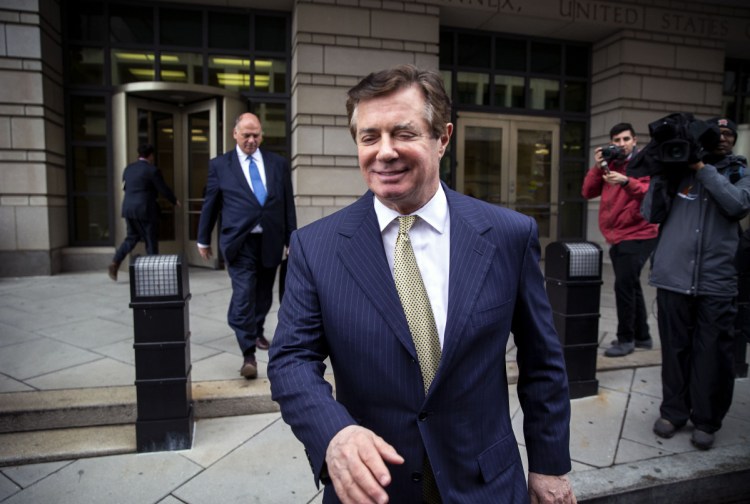Paul Manafort shared 2016 presidential campaign polling data with Konstantin Kilimnik, a former employee whom the FBI has said has ties to Russian intelligence, according to a court filing.
The apparently inadvertent revelation indicates a pathway by which the Russians could have had access to Trump campaign data.
The former Trump campaign chairman on Tuesday denied in a filing from his defense team that he broke his plea deal by lying repeatedly to prosecutors working for special counsel Robert S. Mueller III about that and other issues.
In his rebuttal to the special counsel’s claims of dishonesty, Manafort exposed details of the dispute, much of which centers on his relationship with Kilimnik. The Russian citizen, who began working for Manafort’s consulting firm starting in 2005, has been charged with helping his former boss to obstruct Mueller’s investigation of Russian interference into the 2016 election. He is believed to be in Moscow.
The special counsel alleged Manafort “lied about sharing polling data with Mr. Kilimnik related to the 2016 presidential campaign,” according to the unredacted filing, and discussed Ukrainian politics with Kilimnik during that time.
“Manafort ‘conceded’ that he discussed or may have discussed a Ukraine peace plan with Mr. Kilimnik on more than one occasion,” his attorneys quote the special counsel as saying, and ” ‘acknowledged’ that he and Mr. Kilimnik met while they were both in Madrid.”
In his filing, Manafort’s lawyers said any inconsistencies in those interviews were unintentional.
“Issues and communications related to Ukrainian political events simply were not at the forefront of Mr. Manafort’s mind during the period at issue and it is not surprising at all that Mr. Manafort was unable to recall specific details prior to having his recollection refreshed,” they wrote.
Mueller also said Manafort lied about contacting Trump administration officials after Trump took office. Manafort had told investigators he had no direct or indirect contact with White House officials since Trump’s inauguration, but Manafort had been in touch with officials as recently as the spring, according to the filing.
Manafort told a colleague in February – four months after he was indicted – that he was in contact with a senior administration official through that time, prosecutors said. And in a text message, he authorized another person to speak with a White House official on May 26, they alleged.
In Tuesday’s filing, Manafort’s attorneys said that person was “asking permission to use Mr. Manafort’s name as an introduction in the event the third-party met the President,” which “does not constitute outreach by Mr. Manafort to the President.”
They add that the other example of contact with administration officials “is hearsay purportedly offered by an undisclosed third party and the defense has not been provided with the statement.”
Defense attorneys wrote that Manafort’s months in solitary confinement at the Alexandria jail in Virginia have “taken a toll on his physical and mental health.”
“For several months Mr. Manafort has suffered from severe gout, at times confining him to a wheelchair,” the lawyers wrote. “He also suffers from depression and anxiety and, due to the facility’s visitation regulations, has had very little contact with his family.”
Prosecutors had accused Manafort of telling “multiple discernible lies” over the course of 12 interviews with investigators and two grand jury appearances since his guilty plea in September in Washington to conspiring to defraud the United States and conspiring to obstruct justice through his undisclosed lobbying for a pro-Russian politician in Ukraine.
U.S. District Judge Amy Berman Jackson has ordered the special counsel to respond and set a Jan. 25 hearing date to air the dispute.
In the Tuesday filing, Manafort’s lawyers said the disagreement can be dealt with through the sentencing process, because prosecutors have said they have no plans to file fresh charges.
The longtime Republican consultant already faces a possible maximum, 10-year prison sentence in his D.C. case under federal guidelines for conspiring to cheat the Internal Revenue Service, violate foreign-lobbying laws and tamper with witnesses. That time could come in addition to his punishment for separate convictions in Virginia on tax and bank fraud charges.
Manafort faces a tentative March 5 sentencing date in his federal case in D.C. If he is found to have breached the deal, he would lose any sentencing credits for acceptance of responsibility, prosecutors said.
The longtime lobbyist is set for sentencing Feb. 8 in Virginia before U.S. District Judge T.S. Ellis III of Alexandria .
Under the agreement with prosecutors in his D.C. case, Manafort also was ordered to forfeit an estimated $15 million he hid from the IRS, but was permitted to keep some property held with relatives. In return for his cooperation, he hoped to have prosecutors recommend leniency, possibly slicing years off his prison term.
Prosecutors said Manafort also lied about the circumstances of a $125,000 wire transfer in 2017.
Send questions/comments to the editors.



Success. Please wait for the page to reload. If the page does not reload within 5 seconds, please refresh the page.
Enter your email and password to access comments.
Hi, to comment on stories you must . This profile is in addition to your subscription and website login.
Already have a commenting profile? .
Invalid username/password.
Please check your email to confirm and complete your registration.
Only subscribers are eligible to post comments. Please subscribe or login first for digital access. Here’s why.
Use the form below to reset your password. When you've submitted your account email, we will send an email with a reset code.